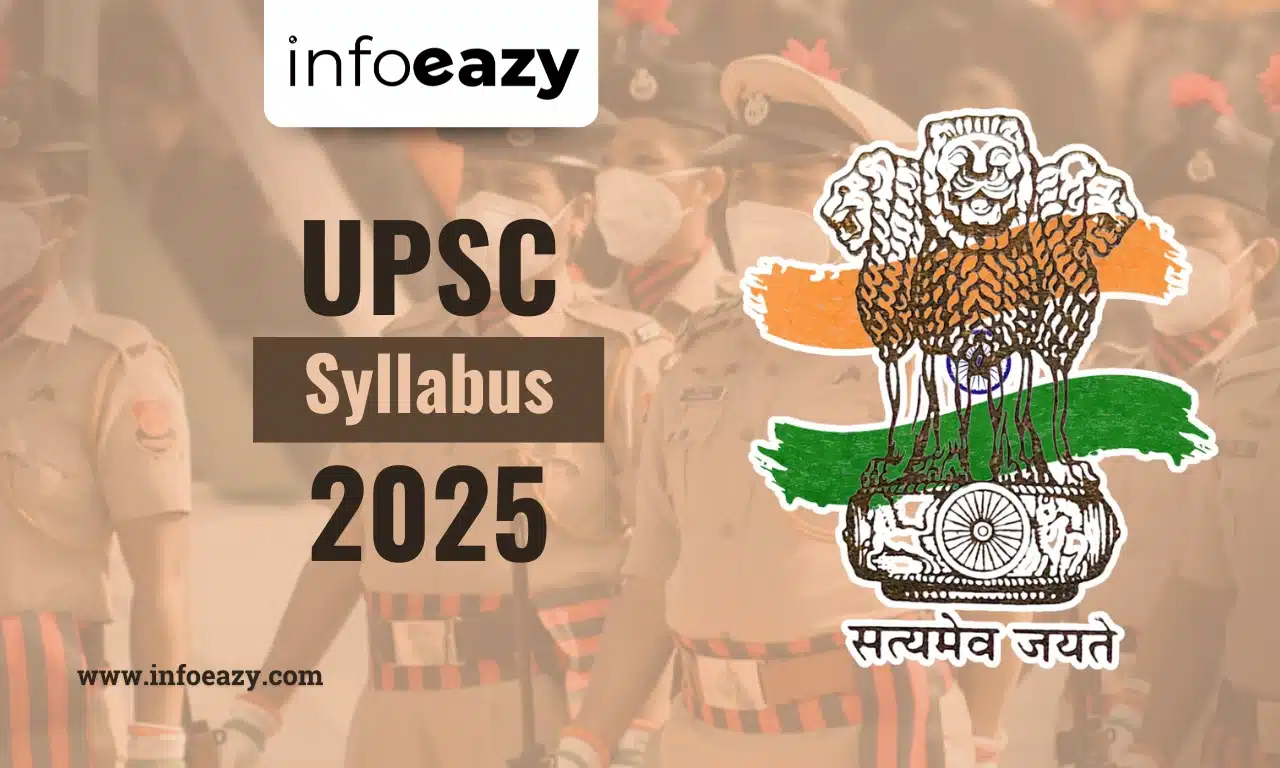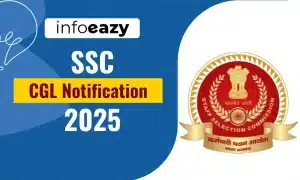The UPSC Syllabus 2025 is designed to provide a clear understanding for aspirants appearing for the UPSC Exam 2025. The exam consists of two main stages, Prelims and Mains. The Prelims include two mandatory papers, General Studies Paper-I and General Studies Paper-II (also known as CSAT or Civil Services Aptitude Test). The Mains stage consists of nine papers, one Essay paper, four General Studies papers, two Optional Subject papers, and two Language papers (both qualifying in nature). Download the UPSC Syllabus 2025 PDF to review the complete list of topics and start your preparations accordingly.
UPSC Syllabus 2025
UPSC conducts various exams to recruit eligible candidates for different Grade “A” and Grade “B” positions in the government sector. The latest UPSC Syllabus 2025 has been released along with the UPSC Notification 2025, designed to assist candidates in their exam preparation. The selection process consists of three stages: Prelims, Mains, and Interview.
The Prelims exam includes two papers, containing 100 and 80 objective-based questions respectively. The Mains exam comprises nine papers and is descriptive in nature. The Interview stage, also known as the Personality Test, assesses the candidate’s confidence, communication skills, and overall suitability for the position.
UPSC Syllabus 2025 PDF
The Union Public Service Commission (UPSC) has released the UPSC Syllabus 2025 PDF on its official website at upsc.gov.in. Candidates can follow the link to download the PDF and gain detailed insights to prepare efficiently for the UPSC Exam 2025.
UPSC Syllabus 2025 for Prelims
Every year, lakhs of applicants appear for the UPSC Prelims Exam 2025, which is the first stage of the UPSC Selection Process 2025. It is an objective-type exam and is qualifying in nature. The UPSC Exam Pattern 2025 for Prelims consists of two objective-type papers, as detailed in the table below.
| UPSC Syllabus 2025 for Prelims | |
| Aspect | Details |
| Compulsory Papers |
|
| Number of Questions |
|
| Total Marks |
|
| Negative Marking | 1/3rd of the marks allotted per question will be deducted for each wrong answer |
| Time Allotted |
|
UPSC Prelims Syllabus for Paper 1 for General Studies (GS)
The UPSC Prelims Syllabus for Paper 1 for General Studies (GS) evaluates the overall knowledge and awareness which comprises static and dynamic portions. The UPSC Prelims Syllabus for General Studies (GS) comprises topics from Polity, Geography, History, Economy, Science and Tech, Environment discussed below:
- Current events of national and international importance
- History of India and Indian National Movement
- Indian and World Geography – Social, Physical, Economic Geography of the World and India.
- Governance and Polity in India – Rights Issues, Constitution, Public Policy, Political System, Panchayati Raj, etc.
- Social and Economic Development – Social Sector initiatives, Demographics, Sustainable Development, Inclusion, Poverty, etc.
- General issues on Biodiversity, Environmental Ecology, & Climate Change – these topics do not require subject specialization.
- General Science
UPSC Prelims Syllabus for Paper 2 for CSAT
The UPSC Prelims Syllabus for Paper 2 for CSAT includes subjects such as Reasoning and Analysis, Quantitative Aptitude, and Reading Comprehension. Below, we have shared a list of important topics that will be included in the exam:
- Comprehension
- Communication and Interpersonal Skills
- Analytical ability and Logical Thinking
- Problem Solving and Decision Making
- General Mental Ability
- Basic Numeracy, i.e. orders of magnitudes, numbers & their relations, etc (class 10 level)
- Interpretation of Data (charts, tables, graphs, data sufficiency, etc. – Also class 10 level)
UPSC Mains Syllabus 2025
The UPSC Mains Syllabus 2025 includes 9 papers, out of which 2 are qualifying in nature, each carrying 300 marks, while the remaining 7 papers are considered for the final merit. The UPSC Mains Exam 2025 will be conducted over 5 days as scheduled by the Commission. These subjects are designed to evaluate the candidates’ intellectual abilities and depth of understanding, rather than testing their knowledge and memory.
| UPSC Mains Syllabus 2025 | ||
| Paper | UPSC Mains Exam Pattern 2025 | Marks |
| Paper-I | Essay (can be written in the medium of the candidate’s choice) | 250 |
| Paper-II | General Studies – I (Indian Heritage & Culture, History & Geography of the World & Society) | 250 |
| Paper-III | General Studies – II (Governance, Constitution, Polity, Social Justice & International Relations) | 250 |
| Paper-IV | General Studies – III (Technology, Economic Development, Biodiversity, Security & Disaster Management) | 250 |
| Paper-V | General Studies – IV (Ethics, Integrity & Aptitude) | 250 |
| Paper-VI | Optional Subject – Paper I | 250 |
| Paper-VII | Optional Subject – Paper II | 250 |
UPSC Mains Qualifying Papers 2025
The UPSC Mains Exam 2025 includes two qualifying papers: the Indian Language Paper and the English Language Paper. These papers assess the candidates’ reading and comprehension abilities in a clear and precise manner. Below are some important points regarding these qualifying exams:
- The marks obtained in the UPSC Mains Qualifying Papers 2025 will not be counted towards the final merit list.
- These exams are of a qualifying nature only, and candidates must secure a minimum of 25% marks in each paper to qualify.
- If a candidate fails to qualify in either of the language papers, the marks obtained in the other papers will not be considered for the final evaluation.
UPSC Essay Syllabus
Candidates have to write essays on various varied topics. They should maintain a clear focus on the subject, structure their thoughts logically, and express themselves with clarity and write concisely. Marks will be given for efficient, accurate, and effective writing.
UPSC GS 1 Syllabus 2025 for Mains
Indian culture will include the prominent aspects of art forms, literature, and architecture from ancient to modern times.
- Modern Indian history from about the middle of the eighteenth century until the present- significant events, personalities, issues.
- The Freedom Struggle — its various stages and important contributors/contributions from different parts of the country.
- Post-independence consolidation and reorganization within the country.
- History of the world will include events from the 18th century such as industrial revolution, world wars, redrawal of national boundaries, colonization, decolonization, political philosophies like communism, capitalism, socialism etc.— their forms and effect on the society.
- Salient features of Indian Society, Diversity of India.
- Role of women and women’s organization, population and associated issues, poverty and developmental issues, urbanization, their problems and their remedies.
- Effects of globalization on Indian society.
- Social empowerment, communalism, regionalism & secularism.
- Salient features of the world’s physical geography.
- Distribution of key natural resources across the world (including South Asia and the Indian sub-continent); factors responsible for the location of primary, secondary, and tertiary sector industries in various parts of the world (including India).
- Important Geophysical phenomena such as earthquakes, Tsunami, Volcanic activity, cyclones etc., geographical features and their location-changes in critical geographical features (including water-bodies and ice-caps) and in flora and fauna and the effects of such changes.
UPSC GS 2 Syllabus 2025 for Mains
Governance, Constitution, Polity, Social Justice and International relations. These topics cover the frameworks, principles, and functioning of government institutions, the rights and duties of citizens, issues related to equality and justice in society, and India’s interactions with the global community.
- Indian Constitution—historical underpinnings, evolution, features, amendments, significant provisions and basic structure.
- Functions and responsibilities of the Union and the States, issues and challenges pertaining to the federal structure, devolution of powers and finances up to local levels and challenges therein.
- Separation of powers between various organs dispute redressal mechanisms and institutions.
- Comparison of the Indian constitutional scheme with that of other countries.
- Parliament and State legislatures—structure, functioning, conduct of business, powers & privileges and issues arising out of these.
- Structure, organization and functioning of the Executive and the Judiciary—Ministries and Departments of the Government; pressure groups and formal/informal associations and their role in the Polity.
- Salient features of the Representation of People’s Act.
- Appointment to various Constitutional posts, powers, functions and responsibilities of various Constitutional Bodies.
- Statutory, regulatory and various quasi-judicial bodies.
- Government policies and interventions for development in various sectors and issues arising out of their design and implementation.
- Development processes and the development industry —the role of NGOs, SHGs, various groups and associations, donors, charities, institutional and other stakeholders.
- Welfare schemes for vulnerable sections of the population by the Centre and States and the performance of these schemes; mechanisms, laws, institutions and Bodies constituted for the protection and betterment of these vulnerable sections.
- Issues relating to development and management of Social Sector/Services relating to Health, Education, Human Resources.
- Issues relating to poverty and hunger.
- Important aspects of governance, transparency and accountability, e-governance- applications, models, successes, limitations, and potential; citizens charters, transparency & accountability and institutional and other measures.
- Role of civil services in a democracy.
- India and its neighbourhood- relations.
- Bilateral, regional and global groupings and agreements involving India and/or affecting India’s interests.
- Effect of policies and politics of developed and developing countries on India’s interests, Indian diaspora.
- Important International institutions, agencies and for as – their structure, mandate.
UPSC GS 3 Syllabus 2025 for Mains
Technology, Economic Development, Bio diversity, Environment, Security and Disaster Management, These areas focus on advancements in science and technology, strategies for sustainable economic growth, conservation of biological diversity, protection of the environment, national and international security challenges, and the management and mitigation of disasters.
- Indian Economy and issues relating to planning, mobilization, of resources, growth, development and employment.
- Inclusive growth and issues arising from it.
- Government Budgeting.
- Major crops-cropping patterns in various parts of the country, – different types of irrigation and irrigation systems storage, transport and marketing of agricultural produce and issues and related constraints; e-technology in the aid of farmers.
- Issues related to direct and indirect farm subsidies and minimum support prices; Public Distribution System-objectives, functioning, limitations, revamping; issues of buffer stocks and food security; Technology missions; economics of animal-rearing.
- Food processing and related industries in India- scope’ and significance, location, upstream and downstream requirements, supply chain management.
- Land reforms in India.
- Effects of liberalization on the economy, changes in industrial policy and their effects on industrial growth.
- Infrastructure: Energy, Ports, Roads, Airports, Railways etc.
- Investment models.
- Science and Technology- developments and their applications and effects in everyday life.
- Achievements of Indians in science & technology; indigenization of technology and developing new technology.
- Awareness in the fields of IT, Space, Computers, robotics, Nano-technology, bio-technology and issues relating to intellectual property rights.
- Conservation, environmental pollution and degradation, environmental impact assessment.
- Disaster and disaster management.
- Linkages between development and spread of extremism.
- Role of external state and non-state actors in creating challenges to internal security.
- Challenges to internal security through communication networks, role of media and social networking sites in internal security challenges, basics of cyber security; money-laundering and its prevention.
- Security challenges and their management in border areas – linkages of organized crime with terrorism.
- Various Security forces and agencies and their mandate.
UPSC GS Paper 4 Syllabus 2025 for Mains
Ethics, Integrity and Aptitude, This area evaluates the candidates’ moral and ethical judgment, their ability to demonstrate honesty and consistency in decision-making, and their aptitude for handling complex situations with objectivity and fairness.
- Ethics and Human Interface: Essence, determinants and consequences of Ethics in-human actions; dimensions of ethics; ethics – in private and public relationships. Human Values – lessons from the lives and teachings of great leaders, reformers and administrators; role of family society and educational institutions in inculcating values.
- Attitude: content, structure, function; its influence and relation with thought and behaviour; moral and political attitudes; social influence and persuasion.
- Aptitude and foundational values for Civil Service, integrity, impartiality and non-partisanship, objectivity, dedication to public service, empathy, tolerance and compassion towards the weaker-sections.
- Emotional intelligence-concepts, and their utilities and application in administration and governance.
- Contributions of moral thinkers and philosophers from India and world.
- Public/Civil service values and Ethics in Public administration: Status and problems; ethical concerns and dilemmas in government and private institutions; laws, rules, regulations and conscience as sources of ethical guidance; accountability and ethical governance; strengthening of ethical and moral values in governance; ethical issues in international relations and funding; corporate governance.
- Probity in Governance: Concept of public service; Philosophical basis of governance and probity; Information sharing and transparency in government, Right to Information, Codes of Ethics, Codes of Conduct, Citizen’s Charters, Work culture, Quality of service delivery, Utilization of public funds, challenges of corruption.
- Case Studies on above issues.
UPSC Optional Syllabus 2025
Optional Subject Papers I and Paper I which includes:
- UPSC Agriculture Syllabus
- UPSC Animal Husbandry and Veterinary Science Syllabus
- UPSC Anthropology Syllabus
- UPSC Botany Syllabus
- UPSC Chemistry Syllabus
- UPSC Civil Engineering Syllabus
- UPSC Commerce and Accountancy Syllabus
- UPSC Economics Syllabus
- UPSC Electrical Engineering Syllabus
- UPSC Geography Syllabus
- UPSC Geology Syllabus
- UPSC History Syllabus
- UPSC Law Optional Syllabus
- UPSC Management Syllabus
- UPSC Maths Optional Syllabus
- UPSC Mechanical Engineering Syllabus
- UPSC Medical Science Syllabus
- UPSC Philosophy Syllabus
- UPSC Physics Optional Syllabus
- UPSC PSIR Optional Syllabus
- UPSC Psychology Syllabus
- UPSC Public Administration Optional Syllabus
- UPSC Sociology Optional Syllabus
- UPSC Statistics Syllabus
- UPSC Zoology Syllabus
- UPSC Literature Syllabus of any one of the following languages: Assamese, Bengali, Bodo, Dogri, Gujarati, Hindi, Kannada, Kashmiri, Konkani, Maithili, Malayalam, Manipuri, Marathi, Nepali, Odia, Punjabi, Sanskrit, Santhali, Sindhi, Tamil, Telugu, Urdu and English.
| Other Related Posts of UPSC 2025 | |
| UPSC Notification 2025 | UPSC Final Result 2025 |
| UPSC Syllabus 2025 | UPSC Exam Pattern |
| UPSC Age Limit | UPSC Vacancy 2025 |
| UPSC Calendar 2025 | UPSC Optional Subjects List |
| UPSC Post List | UPSC Cut Off |
| UPSC Prelims Admit Card | UPSC Book List |
UPSC Syllabus 2025 FAQs
Q1. What is the UPSC syllabus 2025?+
Q2. Will there be UPSC exam in 2025?+
Q3. What is the syllabus of UPSC 2026?+
Q4. Can I crack IAS in 3 months?+
Q5. Is optional removed from UPSC 2025?+
Tags: upsc upsc exam upsc syllabus




